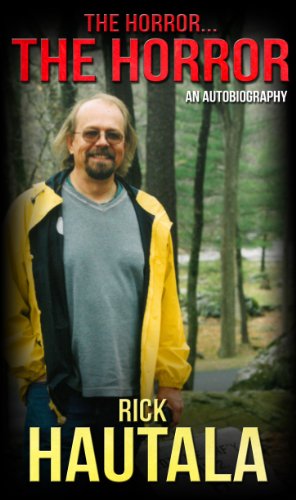 By RICK HAUTALA (Crossroad Press; 2013)
By RICK HAUTALA (Crossroad Press; 2013)
The passing of Rick Hautala in March of 2013 was a great loss to the horror field, but he left behind nearly 30 interesting novels, and also this frank and instructive memoir. According to an afterward by Hautala’s widow Holly, THE HORROR…THE HORROR was drafted back in 2009 and apparently discarded (with only a hard copy surviving among Hautala’s papers) because, Holly suggests, Hautala decided that nobody would want to read the book—a decision that if true seems quite characteristic.
Based on what he writes here, self-effacement appears to have been Rick Hautala’s defining trait. Of his life he has this to say: “I do feel bad about not being able to impress you with a life lived full of adventure and intrigue. But I’m “just” a writer.” He’s also quite cognizant of the fact that without the help of Stephen King, an old college pal, Hautala’s first novel MOONDEATH would have never been published by Zebra Books in 1980.
Hautala published several more Zebra titles, including NIGHT STONE, which he claims was a bestseller only because Zebra graced its cover with a gaudy hologram. Thus he was “depressed instead of elated” by the book’s success, and took a lucrative offer from Warner Books. This apparently pissed off Zebra, and led to what seemed a complete dissolution of Hautala’s writing career in the mid-nineties. He sprang back through tenacity (although of course Hautala doesn’t give himself any credit) and the help of his writer/publisher pals. The memoir concludes on a somewhat tenuous note, with Hautala admitting the publishing industry is more cutthroat than ever but still keeping his head up.
If I have a complaint about this book it’s that it could have stood to be a lot longer. Hautala doesn’t provide much information about the writing of any of his novels outside MOONDEATH, and allows only cursory glimpses of his personal life (which encompassed two marriages, just as many sons and an abusive older brother)—more examples, it seems, of his inferiority complex at work. Yet the unerring honesty with which Hautala recounts his career is reward enough, as is his generous advice to others about starting and sustaining a writing career. Hautala’s warm-hearted nature is just as evident here as his self-deprecation, and makes for a fitting final word by an author who will be sorely missed.
